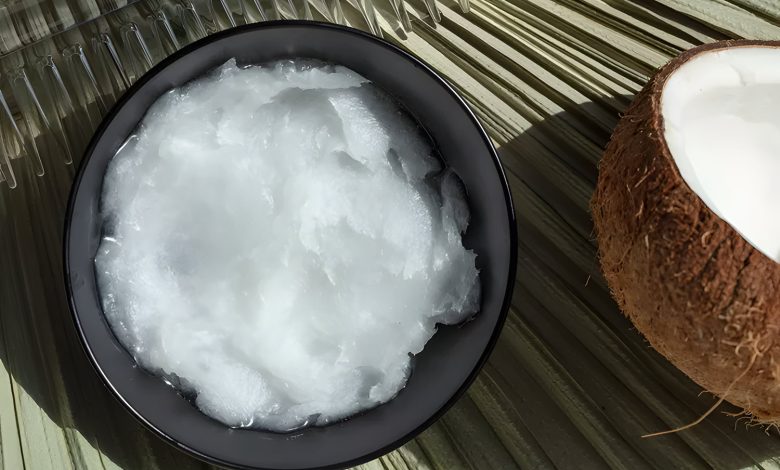
You can also keep some coconut oil in your bathroom cabinets. Despite the fact that studies have shown the benefits of consuming the oil orally1, you may want to reconsider the elixirs’ topical efficacy. Don’t throw out your favorite jar yet.
Coconut oil can be good for the skin due to its antibacterial and moisture retention properties. However, it may cause acne in those with acne-prone skin. Jessie Cheung says that coconut oil is an excellent natural moisturizer, especially for those who want to avoid chemicals. However, it should be applied to the skin, not the face, to avoid clogging the pores and causing acne.
Coconut oil is the least expensive and most accessible product for radiant, supple skin. We asked Dr. Cheung, Carl Thornfeldt, Anar Mikailov and Danielle Conte to help us determine if coconut oil is the right choice for your skin and how you can incorporate it into a beauty routine.
What is Coconut Oil?
“Coconut Oil is derived from coconut meat (white part) and known to contain biosimilar fatty acids, antioxidants, and anti-inflammatories,” Dr. Mikailov explains. The oil is high in lauric, myristic, palmitic, and saturated fat acids that have antimicrobial and antibiotic properties. It contains compounds such as squalanes, phytosterols and tocopherols.
Coconut Oil
- Type: Oil/emollient
- Benefits: Because it’s occlusive (sits on top of skin), it traps moisture beneath. It helps to smooth skin and seal in moisture.
- Who should use it: Anyone with skin that is not prone acne or congestion.
- How often you can use it: Use as a makeup remover at night or massage your skin after showering to reduce congestion.
- Use Coconut Oil Alone This oil is compatible with
- Coconut oil is safe to use with: No known adverse reactions have been reported.
Dr. Cheung says coconut oil, which is high in saturated fats, is solid at room temperatures but melts when it’s rubbed on your skin. It acts as an emollient.
Benefits of Coconut Oil on Skin
Coconut oil is antibacterial.The lauric acids found in coconut oils give it antimicrobial qualities to kill bacteria and reduce inflammation.
Exfoliates : Coconut oil “also exfoliates the outer layer dead skin cells to make your skin smoother,” Conte explains.
Removes makeup:Coconut Oil is a great way to remove makeup after a hard day. According to Dr. Thornfeldt, coconut oil is also an antibacterial and yeast agent.
Plump the skin:According Conte, “aquality coconut oil is a wonderful natural ‘anti-aging” moisturizer when applied to the topically.”
Reduces fine lines’ appearance: “When absorbed in your skin and connective tissue, coconut oil can help to reduce fine lines by keeping your connective tissue strong and supple,” Conte explains.
Smoothes skin: “For beauty, Coconut oil is rich in mid-chain fatty acid, which helps to retain moisture content in your skin, while helping it feel silky smooth,” Conte explains.
Reduces inflammation:According a study published in 2019, virgin coconut oil suppressed inflammatory markers, and protected the skin through enhancing skin barrier functions. This test was in vitro so further research is needed.
Increases skin surface lipids:Extra Virgin Coconut Oil was found to reduce transepidermal moisture loss (TEWL).
Who should use it?
Coconut oil is a great way to moisturize your skin. Coconut oil is generally safe for all skin types. Congested skin or acne-prone is the exception. The exception: congested or acne-prone skin.
Dr. Cheung says that coconut oil is high on the scale of comedogenicity, and therefore it should not be used in areas prone to acne.
Dr. Mikailov believes coconut oil is suitable for all skin types. It’s especially good for those with sensitive skin, or eczema. He adds that those with oily, acne-prone and very oily skin should only use coconut oil during the dry winter months.
Coconut oil can be used to treat keratosis pelaris (aka chicken skin) by repairing the lipid layer and providing long-term relief from those dry, itchy, and sometimes bumpy skin conditions.
Coconut Oil Side Effects
Our skin experts say that coconut oil is a great choice for skin care, especially if you have a skin condition such as acne or congestion. Its nutrient-dense composition can work wonders. Coconut oil is a heavy product that’s considered one of the most comedogenic oils available. If you have blackheads and your pores are prone to clogging, it might be best to stay away from this oil. It’s more likely that it will cause a pimple.5 Or you can apply it only to body parts. The scalp and face have fewer oil glands.
Coconut oil can be used as part of a daily skincare regimen if you do not have acne-prone skin. Try using oils such as calendula and tamanu if your skin tends to be oily. These oils may cause fewer breakouts. It is important to remember that these oils may irritate those with sensitive skin or eczema.
How to Use Coconut Oil
Coconut oil is a great alternative to your favorite facial moisturizer and body lotion if you want to simplify your skincare routine. Conte says that the oil is a multitasker, which makes it ideal for people who don’t have time to get ready.
Quality is important for anything that we put on our skin. Dr. Thornfeldt warns that coconut oil of low quality can be highly refined (and potentially contaminated), causing breakouts and irritations. He recommends that you stick to a specific formula for your choice. “I only recommend using purified, liquid cold-pressed coconut oils,” he says.
Dr. Cheung recommends virgin coconut oil as refining can remove antioxidants. We recommend Dr. Bronner’s Whole Kernel Virgin Coconut Oil.
Use the oil to remove makeup by rubbing it between your hands until it becomes liquefied. Then, massage it gently into your skin. This will slowly dissolve the grime from the day. Finish by rinsing with warm water, then patting dry.
Consider using the and repeating the steps above to make sure that every trace of mascara or foundation has been completely removed.
Substitutes to Coconut Oil
Almond, sesame and argan oils are excellent coconut oil alternatives with similar natural moisturizing qualities. Sunflower oil can be used by those with acne-prone skin. Rosehip, jojoba and hemp seed oils are also less congested.




